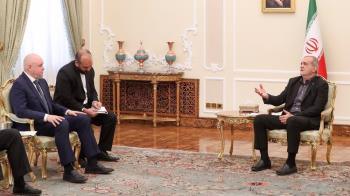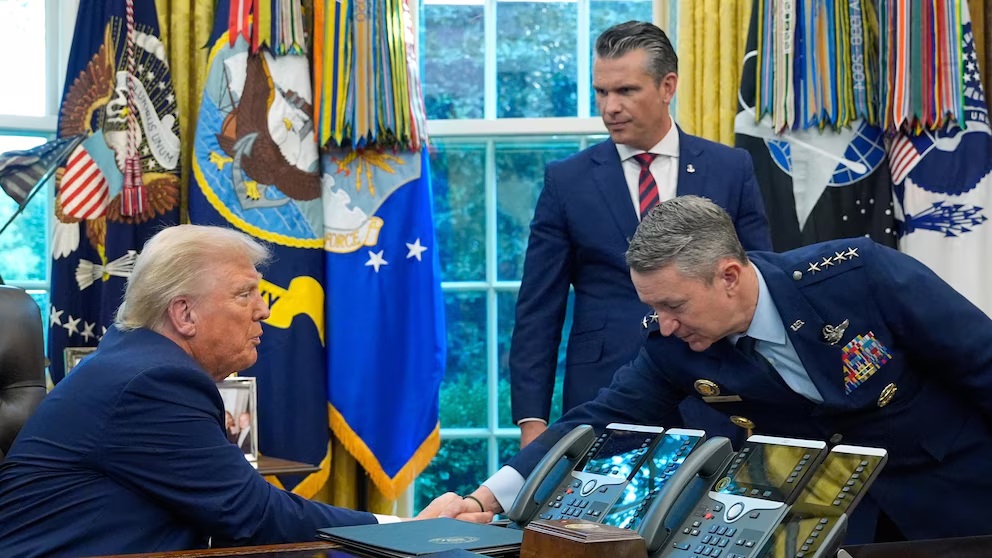Alwaght- Donald Trump is making headlines again, not to end a war but to revive a belligerent name. A president who labels himself the biggest pro-peace figure in today's world and claims he deserves the Noble Peace Prize more than anybody else now is giving a surprise order: Renaming Defense Department to War Department.
This move, which borders on bitter irony, is coming by one whose foreign policy— from pressure on Ukraine and NATO to closeness to Russia as the West's adversary— has always been challenged by critics. The failure to win the Nobel Peace Prize could have pushed him to rename a military institution more honestly instead of seeking peace.
This action once again reminded the world that the countrys hawkish policies, despite decades of seeking to mask the US aggressive face, remains the backbone of Washington's power.
Secretary of Defense Pete Hegseth on Saturday openly talked about "maximum lethality" in wars, and added that "we're going to raise warriors, not just defenders." Now a question presents itself: Why is such decision made at this time? What are the motivations behind it? And what are the reactions does it trigger at home and abroad?
Trump's motivations: Populism, deterrence, or normalizing militarism?
Observers suggest that by renaming the Department of Defense, the US president is seeking multiple major aims:
Addressing his vote base: Trump over and over talked about honesty in politics, claiming that they should not use deceptive names and titles. This renaming for his right-wing supporters establish the white Patriotics, signifies transparency and a return to reality.
Power to confront rivals: By raising war instead of defense, Trump Trump practically tries to break the taboo of militarism and display it as part of the American political identity. We can better understand this issue amid growing competition with the Eastern bloc led by China, Russia, and Iran that are teeming up to undermine the Western hegemony and American unilateralism and that have managed to establish institutions in this path through founding such organizations as BRICS and Shanghai Cooperation Organization (SCO) have attracted the Global South and set of the alarm bells to Washington about the shifting global power equation.
In such situation, Trump, amid shrinking political, economic, and military hegemony wants to tell the rivals he is not afraid of war and will rely on logic of force to maintain the US-led unipolar system.
In a statement supporting this position, Ryan Zinke, a pro-Trump Republican congressman from Montana, said, "The world is unstable. We have bad actors—Putin, North Korea, and Iran are probably the top three. The United States needs to show strength."
Home reactions
This renaming has stirred waves of various reactions inside the US:
Democrats and liberal media outlets decried the move as a sign of Trump's radicalism, warning it would cement US's international image as a warmongering nation.
On Capitol Hill, the reception was far from unanimous, with some lawmakers complaining the change would cost the department millions for what is widely seen as a largely symbolic gesture. Retired Colonel Larry Wilkerson, former chief of staff to Secretary of State Colin Powell under President George W. Bush, told The Hill the effort could run into the hundreds of millions of dollars, calling it "a hugely expensive undertaking."
Broader estimates for renaming hundreds of Pentagon agencies and replacing all their stationery, insignia, and signage—both domestically and on bases abroad—run as high as billions. However, both Pentagon officials and Trump himself have sought to downplay these financial concerns.
The congressional opposition is significant because it has the potential to thwart Trump's action. Despite the president issuing an executive order, changing the Defense Department's official name still requires congressional authorization. A number of Trump's Republican allies in Congress, including Senators Rick Scott, Republican of Florida, and Mike Lee, Republican of Utah, have taken the lead by introducing a bill to enact the change. Meanwhile, Trump-aligned conservatives have welcomed the move, arguing that "defense" only has meaning when the US enemies fear its "war power."
Within the public sphere, a significant portion of the populace—particularly among younger generations—viewed the name change as an affront to human values, a sentiment fueled by memories of the endless wars in Iraq and Afghanistan.
Retired military figures offered mixed perspectives: some described it as a "return to roots," while others warned it risked further eroding the moral legitimacy of the armed forces in the public eye.
Defense Secretary's comments and contradiction to the history of the US wars
The recent statement by Hegseth vowing that the military's "lethality" will increase is a clear reflection of the Trump administration's aggressive policy posture. This rhetoric comes against the backdrop of an armed forces with a well-documented and deeply violent record in modern warfare.
In just the first two decades of the 21st century, the US military's invasions of Afghanistan and Iraq resulted in the deaths of hundreds of thousands of civilians. The American administrations has consistently blocked independent international investigations into its military's conduct concerning civilian casualties and human rights violations. Whenever judges and prosecutors at the International Criminal Court in The Hague have moved to examine these actions, they have faced threats of sanctions and punitive measures from Washington. The most recent example of this was the sanctioning of four ICC officials in June 2024 for their role in pursuing investigations into alleged war crimes by Israeli and American personnel in Gaza.
This explicit emphasis on "lethality" signals that the Pentagon has not only failed to learn from its past but is deliberately embracing it as a core tenet of its military identity.
Department of war to Department of Defense: Efforts to cover up the reality
To fully grasp the significance of this renaming, one must look back to the past:
From its founding in 1789 until the end of the Second World War in 1947, the department was known as the Department of War. In 1947, President Harry Truman signed the National Security Act, which radically restructured the nation's military apparatus. This landmark legislation established the Army and Air Force as independent branches and, along with the Navy, placed them under the authority of a new Secretary of Defense within a unified military structure. Two years later, Congress formally established the Department of Defense through further legislation.
This shift was more than administrative; it served a profound propaganda and psychological purpose: to rebrand aggressive foreign policy and project an image of a nation that was solely a "defender" of peace.
Throughout its history, the U.S. military had played a key role in the suppression of native Red Indians and the destruction of their communities, and the new "Defense" moniker helped whitewash that past. Furthermore, in the early 20th century, as European colonial powers like Britain and France weakened and anti-colonial movements gained momentum across Asia, Africa, and Latin America, the emerging US superpower sought to cast itself as a moral force—a champion of human rights and the defender of nations' sovereignty to expand its global influence. Renaming the War Department was a strategic step aligned with this objective.
In the decades that followed, from the coup in Iran (1953) to the war in Vietnam, bloody American interventions were consistently justified under the cover of "defending freedom."
International aspects and outcomes
An official return to the Department of War bears important consequences.
Disclosing American hypocracy: Many world governments and public opinion see this change an affirmation of what they have named imperialist policy of Washington.
Deeper gaps with Western allies: Thd Europeans, who themselves want to present a pro-peace image, will distance from this approach.
More instability in the world:
Trump's move to rename the Department of Defense back to the Department of War is far more than a symbolic gesture; it is a conscious effort to normalize violence and legitimize aggressive American foreign policy. This shift signals an intent to escalate destabilizing actions internationally, particularly within the geopolitical theaters where Washington competes with its global rivals.
We should, finally, say that renaming to the Department of war in practice unmasks a reality with which the US history is interwoven: The US is more a warmongering power than a defending power.



























